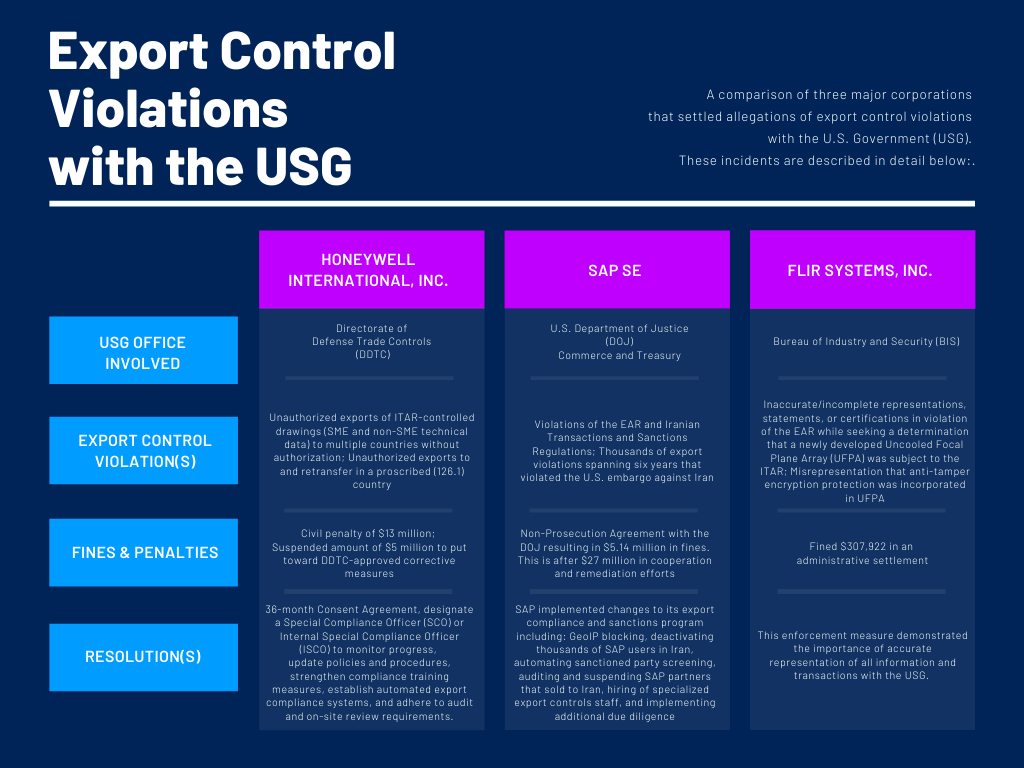The Tip of the Iceberg
Takeaways for exporters of USG technology related to recent USG compliance investigations.
Whether you are advising on International Traffic in Arms Regulations (ITAR), Export Administration Regulations (EAR), Office of Foreign Asset Controls (OFAC), or the many other significant regulations affecting international trade, we as trade compliance professionals are often placed in the challenging position of balancing upholding compliance and adversely impacting the international goals of a company.
For many defense industry professionals, it is easier to blame the regulations for business challenges, rather than to use them as a foundation for proactive and compliant export planning and execution. Unfortunately, companies that view the regulations as the problem are oftentimes dealing with the tip of the iceberg within their compliance department. The problem is inherently not the regulations themselves; it is the policies, processes, and procedures that lay the foundation for operational compliance.
One of the best places to start (besides the regulations) when analyzing a company’s internal compliance program, is to review the Consent Agreements, penalties, and lessons learned from organizations who have recently been investigated by the Directorate of Defense Trade Controls (DDTC). This approach can help shed light on DDTC’s compliance priorities and provide additional direction on where a company should focus their own internal compliance efforts.
What do these settlements tell us about export control compliance?
Internal Compliance Measures Matter:
The way your corporation handles export compliance in its day-to-day operations speaks volumes about the level of compliance within your organization. Ex. if a company is not spending time on record-keeping requirements, that same company will likely have systemic issues with other regulatory requirements, such as proviso compliance. This type of non-compliance, multiplied by the type and sensitivity of the technology involved, can impact the outcome of a USG audit or voluntary disclosures.
Classify, Mark, and Repeat:
It is critically important to know the ITAR USML or EAR ECCN of your hardware, software, technical data, or technology before exporting it. Without this determination, the level of control and requirements for licensing by the ITAR or EAR are unknown. Similarly, once a jurisdiction classification assessment (JCA) is completed, it should be stored in a central repository so that accidental reclassification does not occur. Once hardware classifications are determined, the related ITAR or EAR-controlled documents should be marked appropriately so that internal employees and non-US end-users know how to compliantly handle the information. Remember: U.S. companies are not the only ones responsible for upholding regulatory requirements.
Be Honest in all Your Endeavors:
Defense industry contractors have always battled misguided optics of being “war profiteers.” However, the reality is much more determined by regulatory requirements, and much less by a company’s bottom line. After all, the defense industry as a whole is responsible for protecting our warfighters, allies, supporting foreign policy, and safeguarding national security. That responsibility brings with it the ability to develop powerful, high demand technology that, of course, piques interest by non-U.S. governments and corporations. When this occurs, it is imperative that trade compliance professionals remember that the USG can be their wingman through either Direct Commercial Sales (DCS), Foreign Military Sales (FMS), or pseudo-FMS efforts. There is no immediate gain that justifies the need to misrepresent information, and it will ultimately hurt the corporation’s trust with USG stakeholders. When planning for an international defense sale, it is always a good idea to pre-coordinate, brief, or otherwise inform your USG program office of your future endeavors. The best outcomes occur when the USG and industry are aligned and working together towards a path forward.
Training Across Functions:
Trade compliance is not the only department that should be targeted for export control training. Some of the largest export violations can occur within adjacent departments, such as engineering, business development, program management, and supply chain. Regulatory trainings should be provided to all relevant functions within an organization that create, handle, or export technical data or technology, and they should be tailored toward the audience. Ideally, the trainings should give employees the tools they need to catch potential export issues before they occur or the knowledge of when to report a situation to their trade compliance department.
Remember that a strong export compliance program can protect you against the violations and penalties seen with Honeywell, FLIR, and SAP. Corporations that focus on records management, authorization lifecycle management, JCA’s, ongoing employee training, and early USG engagement will see a return on their investment through faster export authorization response times, overall USG alignment, and successful international sales.
If you have any questions regarding defense sales, compliance program development, JCA’s, USG engagement, or training programs, feel free to contact Defense Trade Solutions.

Comments